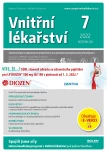-
Medical journals
- Career
New technology in the hypolipidemic drugs development. Inclisiran (LEQVIO)
Authors: Hana Rosolová
Authors‘ workplace: Centrum preventivní kardiologie LF UK v Plzni, 2. interní klinika FN Plzeň
Published in: Vnitř Lék 2022; 68(7): 458-460
Category:
doi: https://doi.org/10.36290/vnl.2022.096Overview
The development of lipid modifying drugs was expanding during the past 30 years. Statins stay to be the first choice drugs in dyslipidemia treatment. Inhibitors of proprotein convertase subtilisin – kexin type 9 (PCSK9) enzyme in combination with statin and/or ezetimibe represent very effective therapy and better atherosclerotic cardiovascular disease (ASCVD) prevention. Antisense therapy based on oligonucleotides belongs to the new technology drugs. This therapy inhibits translation of some proteins important for the production of atherogenic lipid particles. Inclisiran is a small interfering RNA that suppresses translation of PCSK9 in the liver cells. It is applied subcutaneously twice a year and it represents a big chance for the improvement of ASCVD treatment and prevention.
Keywords:
RNA interference – antisense therapy – statins – inclisiran – dyslipidemia therapy
Sources
1. Yamamoto T, Wada F, Harada‑Shiba M. Development of Antisense Drugs for Dyslipidemia. J Atheroscler Thromb. 2016;23(9):1011-1025.
2. Ricotta DN, Frishman W. Mipomersen. A Safe and Effective Antisense Therapy Adjunct to Statins in Patients with Hypercholesterolemia. Cardiol Rev. 2012;20(2):90-95.
3. Warden BA, Duell PB. Volanesorsen for treatment of patients with familial chylomicronemia syndrome. Drugs Today (Barc). 2018;54(12):721-735.
4. Henney NC, Banach M et al. RNA silencing in the management of dyslipidemias. Current Atherosclerosis Reports 2021;23 : 69.
5. Raal FJ, Kallend D, Ray KK. [ORION-9 Investigators]. Inclisiran for the Treatment of Heterozygous Familial Hypercholesterolemia. N Engl J Med. 2020; 382(16):1520-1530.
6. Ray KK, Wright RS, Kallend D. [ORION-10 and ORION-11 Investigators]. Two Phase 3 Trials of Inclisiran in Patients with Elevated LDL Cholesterol. N Engl J Med. 2020;382(16):1507-1519.
Labels
Diabetology Endocrinology Internal medicine
Article was published inInternal Medicine

2022 Issue 7-
All articles in this issue
- Hlavní téma – Nefrologie
- Current options for slowing the progression of chronic kidney disease
- Expert opinion on the cooperation of diabetologists and internists with nephrologists in the care of patients with chronic kidney diseases
- Glomerulonephritides associated with infections
- New developments in anaemia treatment – erythropoietin versus prolyl hydroxylase inhibitors?
- Covid-19 in kidney transplant recipients
- Reactive, infectious, or post‑infectious arthritis?
- Effect of SGLT2 inhibitor empagliflozin on the stabilization of heart failure progress with the possibility of further interventions in a patient with HFrEF – a case report
- New technology in the hypolipidemic drugs development. Inclisiran (LEQVIO)
- Therapy of hypertension in elderly population and its potential risks
- Thyroid incidentalomas
- Můžeme novou léčbou ovlivnit dosavadní terapií neřešený zánět a fibrózu u pacientů s DM2 a CKD?
- Internal Medicine
- Journal archive
- Current issue
- Online only
- About the journal
Most read in this issue- Reactive, infectious, or post‑infectious arthritis?
- Thyroid incidentalomas
- New developments in anaemia treatment – erythropoietin versus prolyl hydroxylase inhibitors?
- Current options for slowing the progression of chronic kidney disease
Login#ADS_BOTTOM_SCRIPTS#Forgotten passwordEnter the email address that you registered with. We will send you instructions on how to set a new password.
- Career

